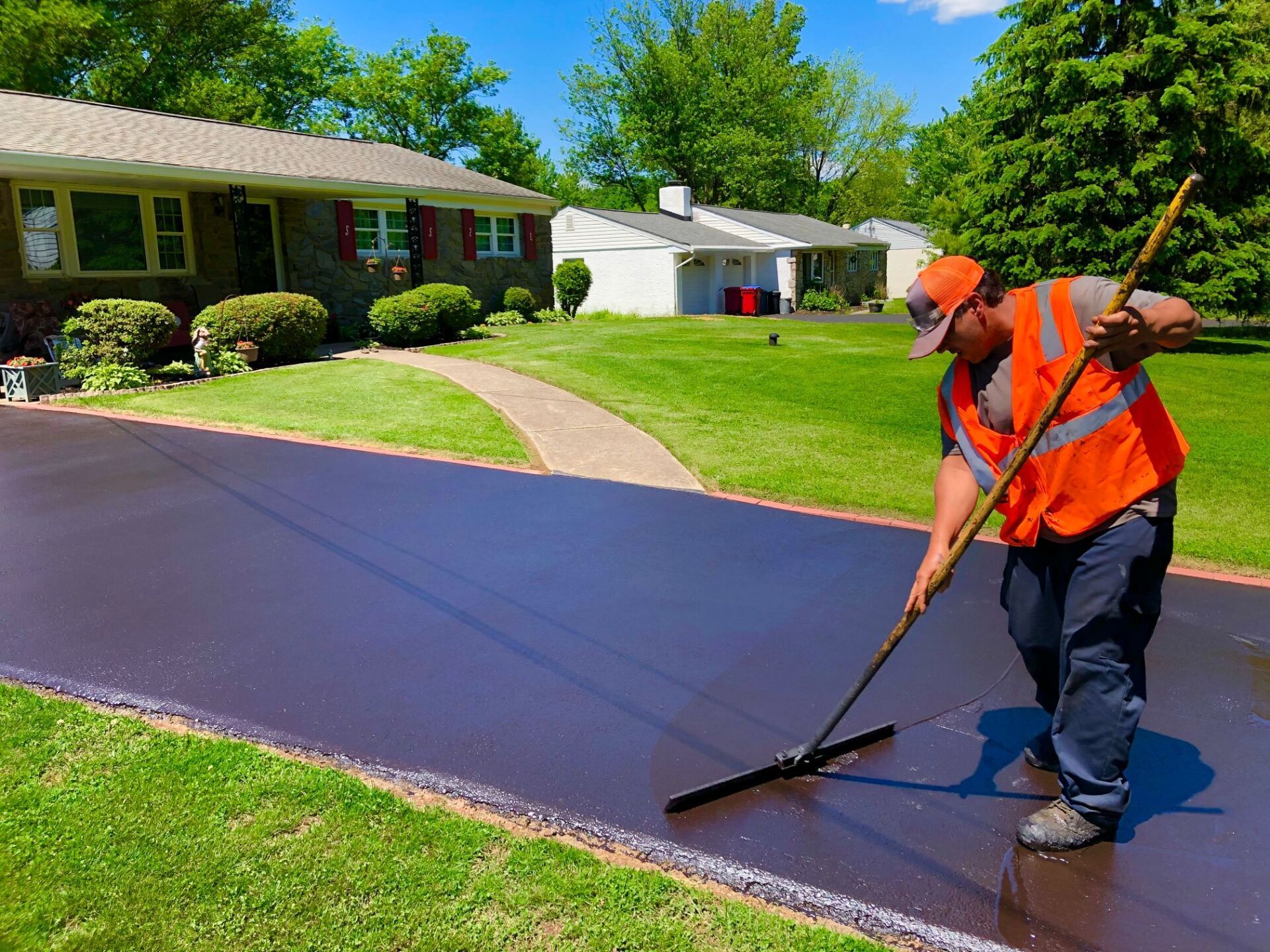Mastering Angled Parking: How Asphalt Sealing Improves Business Whole Lots
Mastering Angled Parking: How Asphalt Sealing Improves Business Whole Lots
Blog Article
Hot Mix Asphalt: A Sustainable Option for Sidewalk
Hot Mix Asphalt (HMA) has actually arised as a leading sustainable choice for pavement solutions, supplying a myriad of cutting-edge modern technologies and ecological advantages. As the demand for environment-friendly construction techniques grows, discovering the nuances of HMA's sustainability can provide useful insights right into the future of sidewalk options.
Ecological Advantages of Hot Mix Asphalt

Furthermore, Warm Mix Asphalt helps to minimize city heat island results. Its dark shade takes in sunlight, reducing the amount of heat showed back into the environment compared to lighter-colored pavements. This can lower ambient temperatures in urban locations, reducing the demand for air conditioning and eventually lowering power usage.
On top of that, Warm Mix Asphalt adds to enhanced stormwater monitoring. Its porous nature allows water to charge and penetrate the sidewalk groundwater products, lowering drainage and the risk of flooding. These environmental benefits make Hot Mix Asphalt a sustainable choice for paving roads and highways.
Energy Efficiency in HMA Manufacturing
Is energy efficiency an essential element in the manufacturing of Warm Mix Asphalt (HMA)? Absolutely. Energy plays a significant role in the manufacturing of HMA, impacting both expense and environmental sustainability. One key element of power efficiency in HMA manufacturing is making use of cozy mix asphalt (WMA) modern technologies (angled parking). WMA permits the blending and positioning of asphalt at reduced temperatures compared to traditional warm mix asphalt, resulting in lowered energy usage throughout production. This procedure not just decreases gas usage but likewise reduces greenhouse gas discharges, making it a more eco-friendly option.
Furthermore, innovations in plant innovations have brought about more energy-efficient HMA manufacturing processes. Modern plants are made with functions like recycled asphalt sidewalk (RAP) processing capacities, effective heater systems, and enhanced insulation, all adding to energy financial savings. By enhancing power usage in HMA manufacturing, the industry can minimize its carbon footprint while preserving premium sidewalk materials. Power effectiveness is, therefore, a critical consideration in guaranteeing the sustainability of Warm Mix Asphalt production.
Recyclability of Hot Mix Asphalt
The recyclability of Warm Mix Asphalt (HMA) is a crucial aspect of its sustainability and long-lasting ecological impact. HMA is among one of the most recycled products in the United States, with over 100 million lots of redeemed asphalt pavement (RAP) being reused every year in new sidewalk building and construction. Recycling HMA offers a number of environmental advantages, such as lowering the need for virgin products, lowering energy usage throughout manufacturing, and reducing the quantity of waste sent to landfills.
The process of recycling HMA involves grating the read review existing pavement, crushing it right into smaller sized items, and blending it with new aggregate and asphalt binder to produce a recycled mix. This recycled mix can frequently carry out in addition to and even much better than standard HMA, while needing less raw products and creating reduced greenhouse gas discharges. By integrating RAP right into new pavement projects, road agencies can conserve natural resources, reduce costs, and minimize the ecological impact of roadway construction and maintenance activities. Overall, the recyclability of HMA plays a considerable function in promoting sustainable practices within the pavement market.

Long-Term Efficiency of HMA
Asphalt sidewalks demonstrate durability and strength over an read review extended duration, reflecting the long-lasting efficiency of Hot Mix Asphalt (HMA) In addition, improvements in HMA modern technology, such as the usage of polymer-modified binders and warm mix asphalt, have better improved the resilience and long life of HMA pavements. By focusing on top quality construction and upkeep practices, HMA continues to verify itself as a lasting and cost-effective service for lasting sidewalk facilities.

HMA: Toughness and Sustainability
Demonstrating both view publisher site durability and sustainability, Warm Mix Asphalt (HMA) has come to be a foundation in the building of lasting sidewalk facilities - commercial parking lot paving. HMA's toughness stems from its capacity to withstand hefty loads, extreme climate condition, and high traffic volumes, making it a reliable option for highways, highways, and airport terminal paths. The structure of HMA, which commonly includes accumulations, binder, and filler, plays a crucial function in boosting its longevity and resistance to damage
Additionally, HMA's sustainability exists in its recyclability and energy-efficient production process. The capacity to recycle reclaimed asphalt pavement (RAP) in brand-new HMA mixtures decreases the demand for virgin products and decreases the environmental effect of sidewalk building and construction and maintenance. Furthermore, the power efficiency of producing HMA depends on its reduced blending temperature levels compared to other pavement products, causing lowered energy usage and greenhouse gas discharges.
Verdict
In verdict, warm mix asphalt (HMA) supplies a lasting solution for sidewalk with its environmentally friendly characteristics. HMA's recyclability, power effectiveness in production, and lasting durability make it an eco-friendly selection for road building and construction.
HMA is one of the most recycled products in the United States, with over 100 million heaps of recovered asphalt pavement (RAP) being recycled annually in brand-new pavement building and construction.The process of recycling HMA includes milling the existing sidewalk, crushing it right into smaller items, and mixing it with brand-new aggregate and asphalt binder to develop a recycled mix.Asphalt pavements show resilience and strength over a prolonged duration, showing the lasting performance of Warm Mix Asphalt (HMA) Additionally, innovations in HMA innovation, such as the usage of polymer-modified binders and warm mix asphalt, have actually further improved the longevity and durability of HMA sidewalks. The ability to reuse redeemed asphalt pavement (RAP) in new HMA combinations decreases the need for virgin materials and reduces the ecological impact of pavement building and construction and upkeep.
Report this page